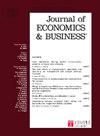The effects of types of banks on financial access and income inequality in a heterogeneous sample: A quantile regression analysis
Abstract
Over time, a substantial amount of theoretical and empirical economic literature has been devoted to examining the relationship between financial access (a relevant component of financial development) and the distribution of income, with mixed findings. We propose a quantile regression approach to study the importance of financial access on income inequality and the effects of cooperative and commercial banking in shaping the relationship. We use data from 57 developed and developing countries from 2004 to 2019. Financial access has been demonstrated to lessen income inequality and the reduction is greater as income inequality increases. When commercial banks are considered instead of their counterparty, the magnitude of the reduction is greater. On the other hand, cooperative banks and credit unions appear to decrease income inequality in low-income countries as they strive for inclusive financial access. This study might provide new insights for policy makers, as they should facilitate access to capital for the most disadvantaged. This would lead to both a greater development of entrepreneurial skills and a better quality of human capital, as they could acquire a higher level of education.

 求助内容:
求助内容: 应助结果提醒方式:
应助结果提醒方式:


